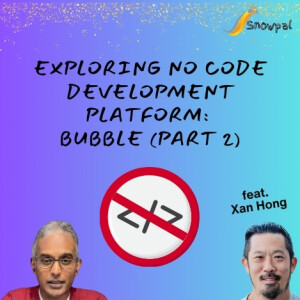
Tuesday Jan 14, 2025
(Part 2) Exploring No Code Development Platform: Bubble (feat. Xan Hong)
In this episode, Xan Hong, a no-code development expert, guides Krish Palaniappan through the process of building a simple to-do application using Bubble. They explore the user interface, create workflows, and discuss the transition from web-based to native app development. The conversation emphasizes practical application, collaboration, and the importance of getting a functional product up and running before focusing on aesthetics.
They explore the Bubble platform, discussing its no-code capabilities, data management, plugin integrations, and design systems. They reflect on the learning curve associated with Bubble, the potential for AI integration, and the future of no-code platforms in the context of evolving technology. The discussion highlights practical applications, user experiences, and the importance of adapting to new tools in software development.
Takeaways
• No-code development can significantly reduce costs for clients.
• Understanding the user interface is crucial for effective app development.
• Starting with a functional prototype is more important than aesthetics.
• Bubble allows for both web and native app development.
• Dynamic elements enhance user interaction in applications.
• Workflows are essential for managing data and user actions.
• Testing and debugging are critical steps in the development process.
• Collaborative development can enhance the learning experience.
• Data management is key to maintaining application functionality.
• User feedback is vital for refining app features.
• Bubble allows users to create applications without writing code.
• Understanding the platform’s structure is crucial for effective use.
• Data management in Bubble includes both data and metadata.
• Plugins enhance functionality but vary in quality.
• Design systems can be created and reused within Bubble applications.
• APIs can be integrated to extend application capabilities.
• The learning curve for Bubble can be steep for new users.
• AI integration presents new challenges for no-code platforms.
• Building meaningful projects can enhance the learning experience.
• No-code platforms are evolving with the introduction of AI technologies.
Chapters
00:00 Introduction to No Code Development
02:55 Exploring Bubble's User Interface
05:52 Creating a To-Do Application
09:10 Understanding Native App Development with Bubble
11:58 Dynamic Elements and User Interaction
15:07 Workflow Creation and Data Management
17:52 Testing and Debugging the Application
20:47 Collaborative Development and Sharing
24:01 Data Management and Deletion Functionality
38:49 Navigating the Bubble Platform
40:46 Understanding Data Management and Metadata
42:49 Exploring Plugins and Third-Party Integrations
45:35 Design Systems and Reusability in Bubble
48:30 Connecting APIs and Backend Functionality
53:44 Recap of Building a To-Do App
55:11 Reflections on No-Code Development
01:01:43 The Learning Curve of Bubble
01:08:14 The Future of AI in No-Code Platforms
No comments yet. Be the first to say something!